- Home
- Media Kit
- MediaJet
- Current Issue
- Past Issues
- Ad Specs-Submission
- Reprints (PDF)
- Photo Specifications (PDF)
- Contact Us
- PRIVACY POLICY
- TERMS OF USE
![]()
ONLINE
![]()
ONLINE

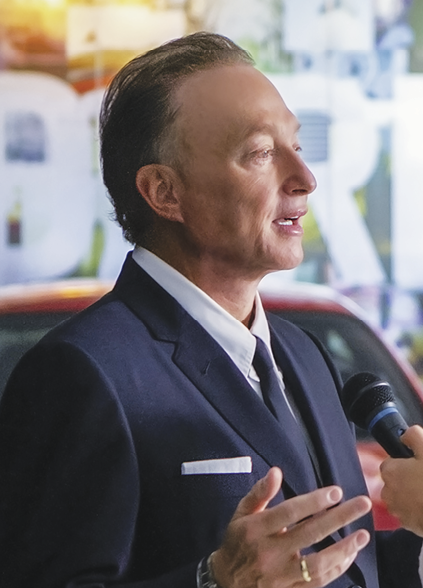
Miles S. Nadal, Founder and Executive Chairman, Peerage Capital
Dare to Dream
Editors’ Note
Miles S. Nadal (milesnadal.com) is an international entrepreneur and philanthropist. His belief in the importance of investing in passion and empowering people to pursue their highest goals has framed his approach to both business and philanthropy. Under Nadal’s ownership, Peerage Capital’s residential real estate business has grown into a Top 10 North American real estate services company with a focus on the luxury market. Peerage Realty Partners invests in the passion of entrepreneurs and their teams to accelerate their growth. Peerage Capital is also a leader in the Canadian self-storage business and in the independent wealth management and investment banking business in Canada and in the U.S.
Nadal has been a consistent force with his ongoing support of many community-focused philanthropic initiatives. These include the Miles S. Nadal JCC, an inclusive urban community hub in Toronto, the Miles Nadal Heart Centre with the Sinai Health Network, the Miles S. Nadal Management Centre at the Schulich School of Business, and the Miles and Kelly Nadal Youth Centre. He is an active supporter of local food banks, summer camps, and programs for young, aspiring entrepreneurs.
In Israel, Nadal’s support extends to the Miles S. Nadal Institute for Technological Entrepreneurship at Tel Aviv University and many other community causes including Yad Vashem, Duvdevan and United Hatzalah.
Nadal has been nominated for Canada’s Top 40 Under 40 and was the recipient of Ernst & Young’s Entrepreneur of the Year Award™. Among his awards are the Harold Lederman Award for Philanthropic Leadership, Jewish National Fund Negev Honoree, Toronto Chapter of the American Marketing Association Marketing Hall of Legends, Executive of the Year by MEDIA Magazine, and Damon Runyon Cancer Research Foundation honoree. Nadal was awarded an Honorary Doctorate of Philosophy degree from Tel Aviv University, and was recognized for contributions to Harlem RBI, an initiative for youth playing, growing, and learning. He is a member of the Board of Governors of Tel Aviv University where he endowed a home for technological innovation and entrepreneurship, as well as serving on the International Board of Governance of The Peres Institute.
Firm Brief
Peerage Capital (peeragecapital.com) is a leading North American business services and private investment firm. It focuses on partnerships with passionate entrepreneurs in the service sectors. In addition to talented teams, it seeks out opportunities to achieve scale through both organic growth as well as acquisitions, operating synergies, and brand differentiation. It supports the partner firms in which it invests by providing capital as well as a team of experienced professionals who add value in such areas as strategy, finance, technology, marketing, mergers and acquisitions, and communications. Peerage Capital’s long-term investments are across several sectors, primarily real estate services, real estate development and management, land assembly, asset management and wealth advisory services. Peerage, though its partner firm, Vaultra, has over 3 million square feet of self storage under ownership, management and development. Across every sector, Peerage Capital operates with a strong culture of partnership, collaboration, and alignment of interests, both economic and cultural. Peerage Capital’s unique “Professional Partnership” model has been refined over 43 years to accelerate growth through value-added services that enhance the sustainable, profitable growth rate of the organization, maximizing value for all stakeholders. Peerage Capital’s largest operating business is Peerage Realty Partners, a leading residential real estate services firm, serving luxury markets across North America. Its partners include leading Sotheby’s International Realty franchisees, and renowned independent firms in both re-sale residential real estate brokerage and new construction marketing. Peerage Realty core service activities include real estate financing, transaction services, asset management, and home improvement for purpose-built rental properties. It is currently one of the top 10 largest residential real estate service firms in North America with over 7,500 best-in-class sales representatives and employees with 276 offices across Canada and the United States selling over $70 billion of residential real estate annually. Peerage Capital has over $16 billion of assets under management across its various platforms.
Where did your interest and passion for philanthropy develop?
My passion for philanthropy first began when I was the recipient of it. When I was 10, I was only able to attend summer camp because of a charitable program that subsidized children from families that could not afford the fees. I was one of those blessed children. For me, it was a transformational experience to have that opportunity to get out of the city and go away to camp for the first time. It maybe does not sound like a big deal, but it provided me with a new experience and really opened my eyes. I promised myself that I would do whatever it took to create the same opportunity for someone else when I got older and could afford it. I take my promises to myself seriously and I have made good on almost all of them, even the ones I made as a very little kid. That’s why, to this day, one of my favorite quotes is from Forest Witcraft: “A hundred years from now it will not matter what my bank account was, the sort of house I lived in, or the kind of car I drove. But the world may be different, because I was important in the life of a young person.”
That experience was the genesis of my commitment to helping others in general and helping children specifically. I have always understood that feeling that you have potential, but you just need a chance to make good on it. I champion children’s causes because early in life, they stand to benefit most from the resources that others may consider small or unimportant.
Over time, my passion for philanthropy has grown, but it has also been refined. When you first have the means, I think it is common to give to almost every worthy cause that tugs at your heart strings. There is that initial feeling of delight that you have the means to give with an open hand.
Over the past couple of decades, however, I’ve gradually taken a more disciplined approach. I have started the Dare to Dream Foundation, and I generally keep my commitments balanced between children, community infrastructure, education, and health. If you fail to do that, over time it can be overwhelming and, arguably, less impactful.
Still, it’s a poorly kept secret that my heartstrings are still easy to tug. I am not rigid about what I support.
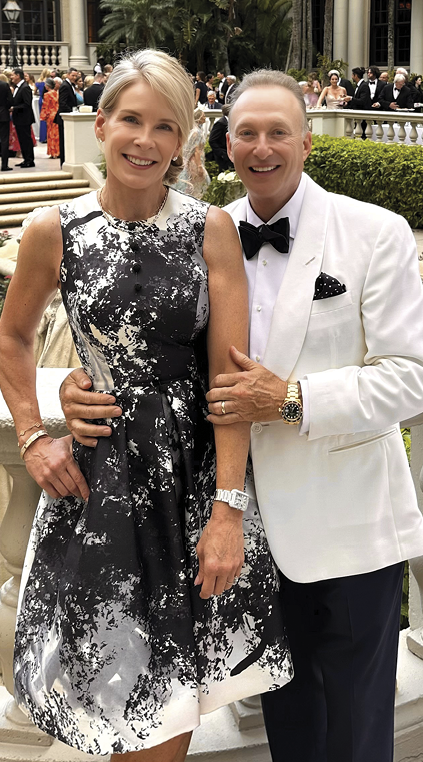
Miles S. Nadal and his wife, Kelly Grier Nadal
Why is philanthropy important to you?
I am very grateful and mindful of my good fortune, and I am extremely blessed for everyone and everything my family and I have in our life. I never lose sight of that. At Peerage, we say “We Invest in Passion.” That is exactly what I do and why I do it.
It gives me great personal joy and emotional satisfaction to know I may have had a small, positive impact on a person or a community. We live in a volatile time when things are always changing. The ability to give people or communities a hand up in these circumstances is a true privilege. This is true in North America and in Israel as well.
What do you feel are the keys to being effective and making an impact in philanthropic work?
Making sure that good intentions translate into meaningful action in real time always requires more effort and follow-up than people may think. It is my view that flexibility and responsiveness are key to effective philanthropy. The world moves very quickly and circumstances and needs can drastically shift overnight.
As I mentioned, I have created the Dare to Dream Foundation – but I remain mindful that to stay relevant it must also stay porous. That means I am always trying to achieve and sustain a balance between sticking to my four buckets of philanthropy while remaining attuned to need as it arises. For example, we have companies across North America and we are consistently supportive of the communities in which we do business. That tends to be purely reactive, based on whatever is happening and finding opportunities to help people in moments of crisis.
The other thing I consider an effective philanthropic strategy is tapping into the enormous value of encouraging people at all levels of our companies to engage with whatever causes or organizations resonate with them. We want to enable their work in meaningfully supporting their communities. We want them to donate time, talent, and treasure to organizations about which they are passionate.
That understanding has led to some very powerful outcomes, not the least of which is the contribution to our own internal culture. At Peerage, we pride ourselves on recruiting and retaining people who are deeply passionate about what they do. That extends very easily to the virtuous circle of philanthropy. I find that building common purpose is a great way to achieve a positive outcome for everyone involved. It is a great motivator for our colleagues to be part of an organization that is socially conscious.
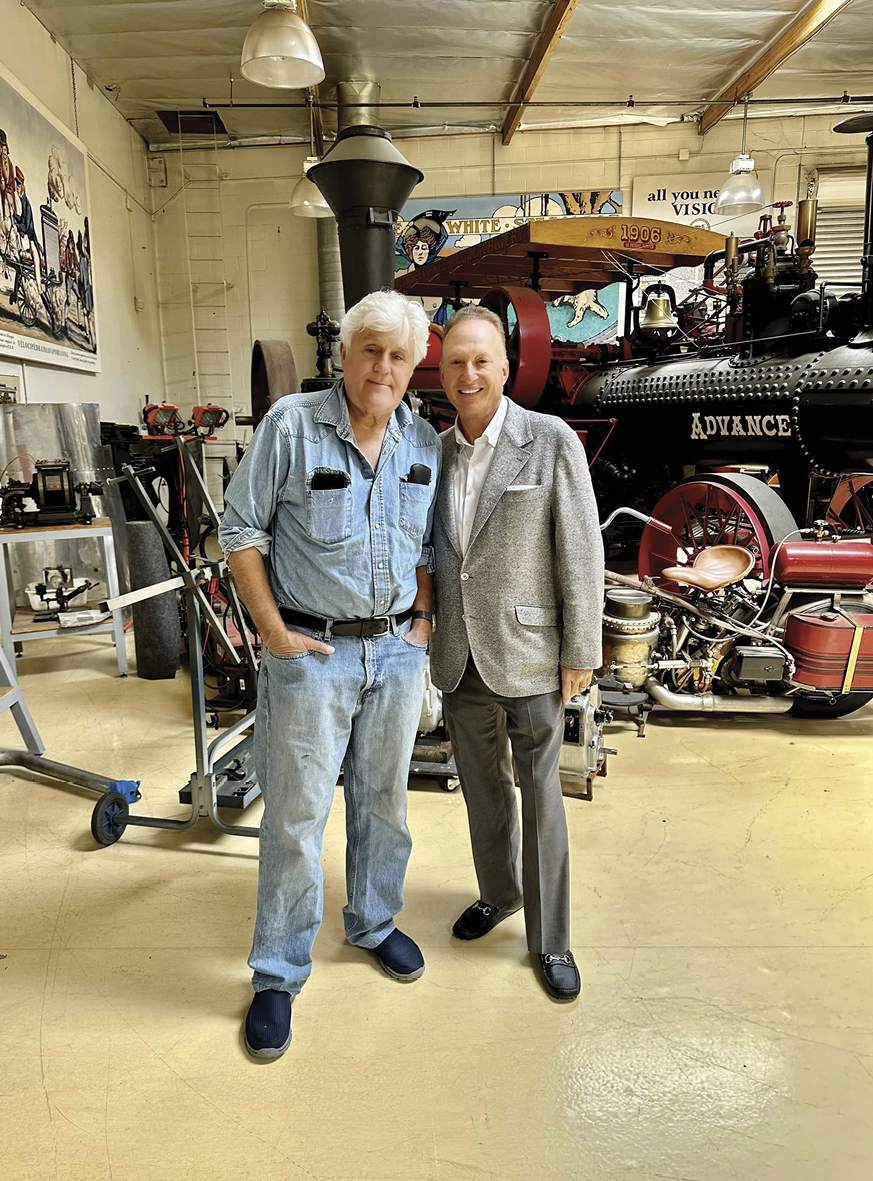
Miles S. Nadal with Jay Leno, renowned comedian
and car collector, at his garage
How do you decide where to focus your philanthropic efforts?
I focus on supporting children, community infrastructure, entrepreneurship, education, and health because each of those areas contributes to providing a hand up rather than a handout. My intent is to help create the circumstances that level the playing field, reward initiative, and enhance opportunity for all. That starts with nurturing children, especially those who are a little further from the starting line in life through no fault of their own. Access to education, as well as some enriched programs, helps build the skills and the confidence that allows people to Dare to Dream and to bet on themselves even in the most competitive markets. Community infrastructure provides the framework for delivering programs, and nothing is possible without good health.
This is the logic that informed my initial approach and, frankly, it has worked well in balancing the discipline and the flexibility that I am seeking from my philanthropic endeavors.
While much of philanthropy is focused on writing checks, you give your time, energy, and ideas to the causes you support. How important is it for your philanthropic activities be more than just about donating money?
We are all part of larger communities, and I am a very big advocate of rolling up your sleeves and getting directly involved in whatever cause inspires you. Today, there are just so many ways to engage and to raise up others. And there is no shortage of need wherever you turn.
We have businesses across North America and one of the common denominators for all of them is philanthropy. Everyone at Peerage and our partner companies is encouraged to leverage their own special talents for a worthy cause and we support them by allocating time for that. In many cases, we will match donations for specific circumstances like flood or hurricane relief.
It starts at the top and our support center, which involves all of our head office team to set the tone. They serve on boards, volunteer at food banks, mentor young entrepreneurs, give their time to kids’ sports programs, deliver Meals on Wheels, participate in food and clothing drives – the list goes on.
And yes, it is always important to provide financial support in tandem with these initiatives.
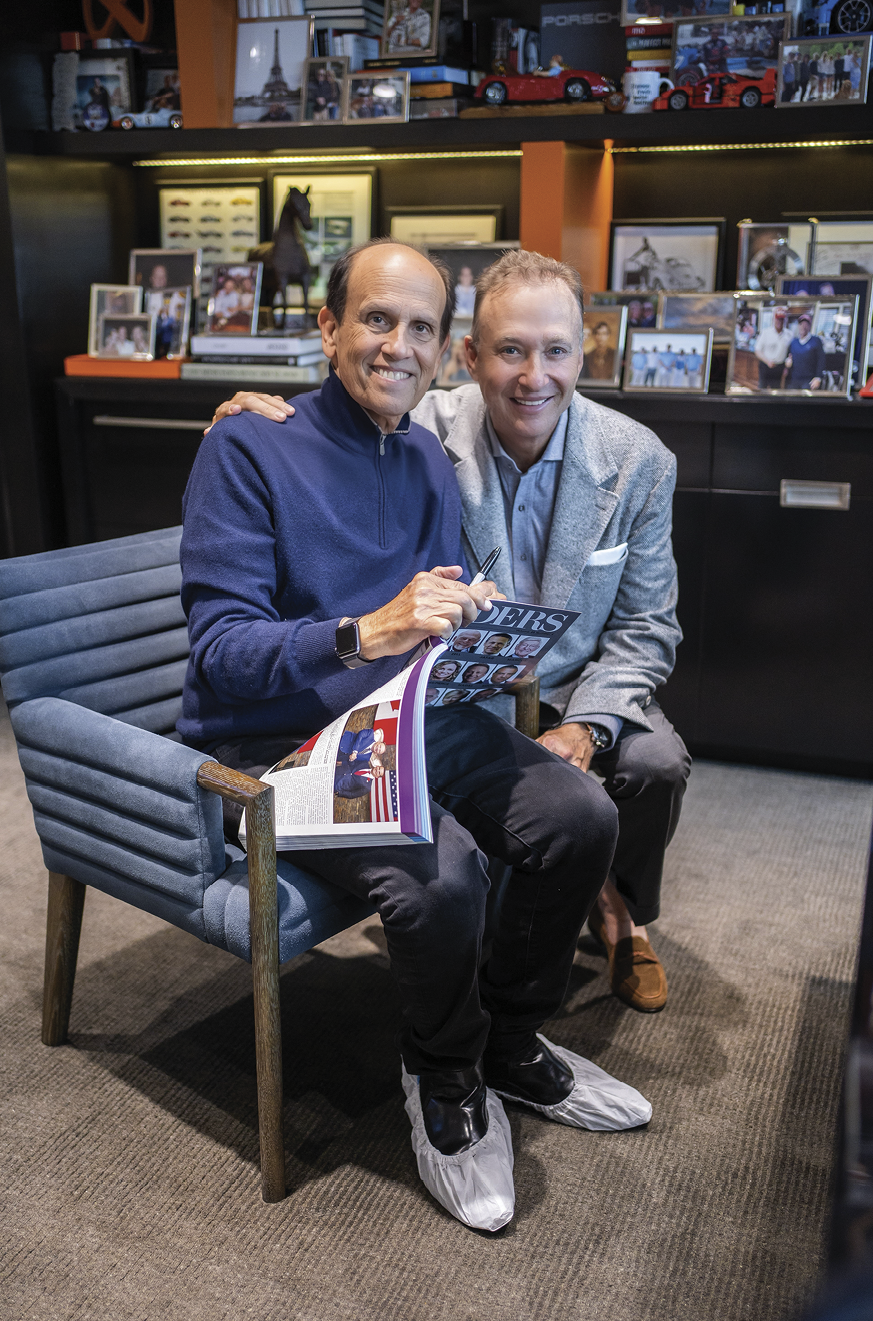
Michael Milken, Financier and Global Philanthropist,
and Miles S. Nadal
Do the same qualities and traits that made you successful in business translate to being effective in philanthropy?
I do believe there is a direct correlation between business and philanthropy. My simple philosophy, and one that is shared across Peerage, is to “do things that matter and get things done.” For one thing, I view my philanthropy as an investment, and I take a portfolio approach. It’s an investment in our broad community with the aim of optimizing human capital. The portfolio approach means that I establish priorities and then put the right pieces in place to move them forward.
Frankly, all leaders have the tools to make meaningful contributions to philanthropy. They operate in a universe where they must be organized, strategic, and highly-focused. That said, and this may be a controversial point of view, but I believe the entrepreneurial mindset tends to make for the most successful philanthropists of all. I say that for several reasons.
For one thing, they are self-starters who know how to superimpose order on chaos. For another thing, in my experience, entrepreneurs are seldom troubled by self-doubt. If you are not confident that you can do better than the prevailing status quo, that you have the ideas that will result in improvements in a business, a sector, or a community, you will not succeed in your venture.
Entrepreneurs are also focused, driven and persistent to see their goals come to fruition. In a philanthropic context, that means they dig in and commit to goals and time-bound and measurable objectives before they commit. They also tend to be very persuasive when it comes to obtaining buy-in from all stakeholders for whichever project they are involved.
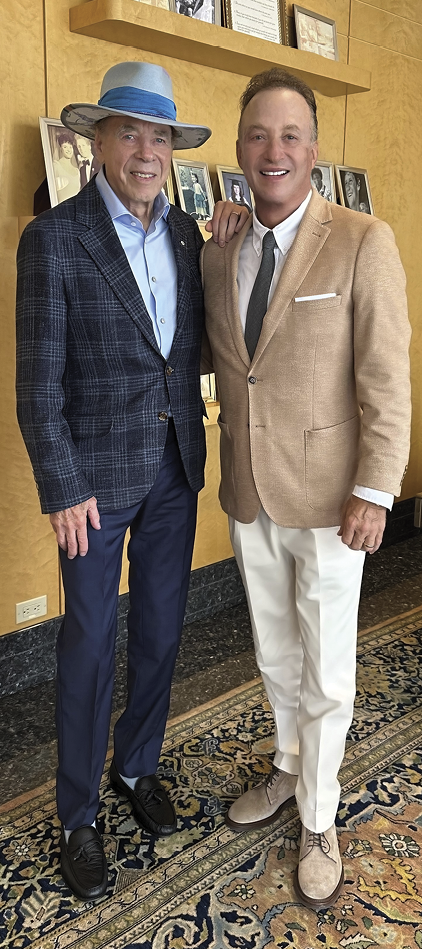
Isadore Sharp, Chairman and Founder,
Four Seasons Hotels and Resort, and Miles S. Nadal
What does success mean to you?
Success is a highly subjective construct and my sense of it has shifted over time. As I get older, I understand situations and people in new ways.
As I have grown as a person, I define success as achieving my objectives while including many others. Ideally, others benefit directly when I succeed. For example, I have amassed a significant collection of rare one-of-a-kind sneakers including the Nike prototype and some pairs worn by Michael Jordan. The proceeds of any future sale of that collection are clearly earmarked within my Foundation for children’s charities.
At a time when there is so much need and inequity in society, it is more important than ever to incorporate some collective good into your own agenda, and to do so from the outset.
More broadly, I set clear goals and then work to excel them, rather than just achieving them. Admittedly, I am aggressive with myself about setting a high bar when it comes to goals. That is why I use the tagline “Dare to Dream” in all my personal ventures, including my charitable foundation.
When you think of legacy, is the impact that you have made on countless lives through your philanthropic work what means the most to you?
My family is my ultimate legacy. Providing for them and ensuring their well-being is always my top priority. Giving back to the broader community is a very close second. I have been blessed with the opportunity to be a bit more reflective in the past few years. Over my career, I have expended a great deal of energy to propel myself forward in life, especially in business. But for that effort to have any lasting meaning, the things I have accomplished must serve others in several ways. The financial outcomes are obvious, but it means a lot to think I might inspire someone else to take a risk, to power through a period of adversity, to create jobs and wealth, to give back.
There are two people who are my role models in business, philanthropy, and legacy: Mike Milken, legendary financier and founder of the Milken Center for Advancing the American Dream, and Isadore Sharp, the founder and Chairman of Four Seasons Hotels and Resorts. Both individuals have accomplished remarkable things personally and professionally. Both live by aspirational principles that will endure within their organizations and throughout society.
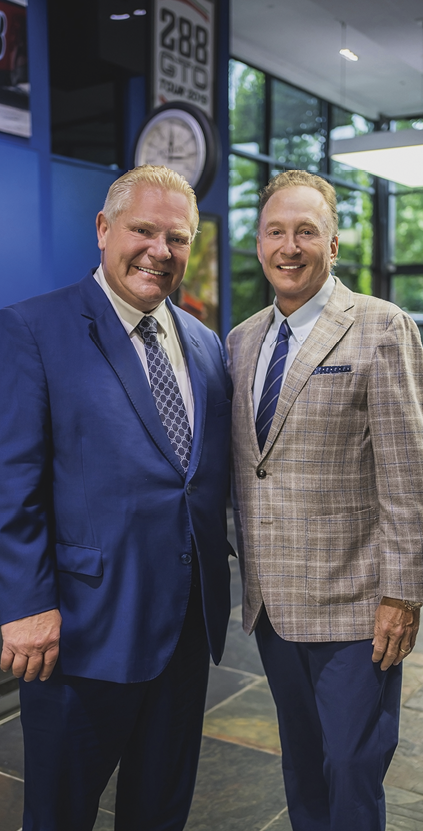
Doug Ford, Premier of Ontario and Miles S. Nadal
Mr. Sharp has had a remarkable impact on the global luxury hospitality sector, setting the highest possible standard for the quality of service and experience at Four Seasons properties around the world. But he has given back so much by setting an example of graciousness and kindness, something that lies at the very heart of Four Seasons’ culture. Of course, he has also done a great deal for his community, but his inspiration really brings out the best in others. He founded the Terry Fox Marathon of Hope that has raised over $1 billion to help cure cancer. His commitment to philanthropy is the most admirable legacy of all.
The other is Mike Milken, an innovative financier and the founder of so many philanthropic organizations. He deploys his energy and his remarkable intelligence to fearlessly tackle some of the greatest challenges in our society by unlocking the power of human potential. The relentless passion he brings to driving new medical research, education, public health, and access to capital is beyond impressive. This is a man who is living his legacy every day by refusing to think small, and always driving forward.
Both individuals have had a significant impact on how I view philanthropy and how I calibrate my overall approach to my business and, yes, more importantly, the legacy of myself and my family.
You are known to always be looking at what is next and to focus on the future. Are you able to enjoy the process and take moments to reflect on your accomplishments?
Entrepreneurs are driven by an intensely forward-focused mindset. It requires enormous discipline, especially in younger years, to slow down a bit and really reflect on things and broaden your perspective. I feel very blessed that over time I have learned the value of being present for my family, friends, colleagues, and my overall circumstances. It doesn’t always come easily, but it is a practice of self-optimization that you can pursue and improve if you set your mind – and your heart – to it.![]()